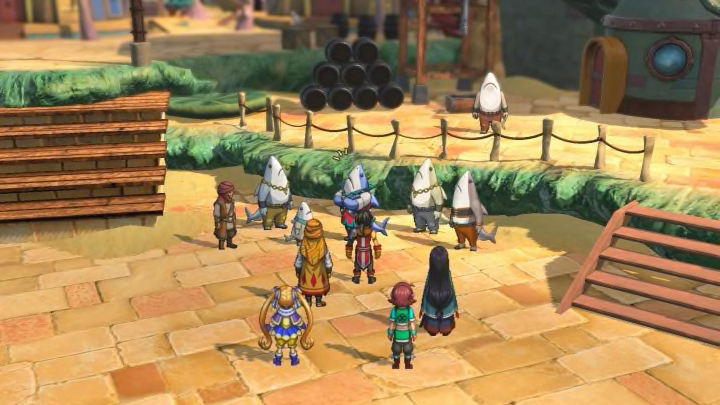Eiyuden Chronicle: Hundred Heroes review – this Suikoden 2 fan is happy
Everything you associate with Suikoden 2 is here

Suikoden 2 is one of the best JPRGs ever, next to Skies of Arcadia, just above Breath of Fire 3. Don’t argue with me because this is the most correct anyone has ever been online. Fact. I’m simply on a different plane of existence, a brilliant, gaseous form floating above the masses as the enlightened look upon my shining grace and scream, “Yes, Kirk, you are right about video games!” Those who disagree will burn in the fires of damnation. Put simply: Suikoden 2 is more goated than a goat farmer. Spiritual sequel Eiyuden Chronicle: Hundred Heroes is, somehow, almost as good, and a fitting tribute to the late game director, writer, and Suikoden creator, Yoshitaka Murayama.
It’s also a tribute to the fans – a new entry to the series in everything but name. It’s a glimpse into an alternate dimension – a better one where there’s no recession and everything doesn’t suck – where Suikoden continued. I adore it. It’s fresh and new while retaining everything that gave the classics such a cult following. I’m a card-carrying member of that cult, by the way. There’s an altar in my head for the Suikoden games and I’ve put up a new pedestal just for Eiyuden Chronicle.
Everything I associate with Suikoden 2 is here. You’re a young commoner lifted above his station and asked to build a resistance force to fight against massive imperial armies and crooked nobles. You do this by traveling the large overworld, visiting towns, recruiting new allies – as the name suggests, up to 100 – and taking part in turn-based battles that come in three flavors: traditional JRPG combat, duels, and war. It also has all the other Suikoden stuff, like base building, minigames, and a virtual economy where you can get rich by trading.
Combat allows you to take up to six characters into battle (though larger allies take up more than one space), which gives you much more choice than most RPGs. That means you can — and actually should! – take someone who can buff your team, as well as a healer, damage dealer, and mage.
It makes your choices feel significant since every single character in this massive cast has their uses. Forget to put a healer in your party and you’ll have to make do with items, which are restricted by carrying capacity, meaning you have to plan ahead of a long journey. You need to think about who’s on which row – front or back – since each character has an effective range. But you can also influence this by equipping certain items, opening up your options even more at the cost of some minor statistical debuffs. There’s a surprising amount of depth to team composition alone.
Some will, of course, dislike how the game approaches random encounters. Where titles like Chained Echoes focus on making every single fight a proper battle, every enemy a threat, Eiyuden Chronicle, like Suikoden before it, sees them as an opportunity to grind for the real fights: the bosses. So for the most part, you can simply click “auto” at the start of random fights and watch your team tear through normal enemies. I don’t mind this, as it speeds up the pace of the game and takes a lot of the busywork out of dungeons and item acquisition, but personal taste may vary. Eiyuden Chronicle understands that you’re not here to fight the fodder – you’re here to progress the story and build up your army. That’s what Suikoden fans want, and that’s what they get.
Building an army and a home base set Suikoden apart from other JRPGs, and it’s better here in almost every way that matters. You collect resources as you travel and can use those, along with allies with specific skills, to add new functions to your castle, increasing the population and adding things such as minigames, buffs, or passive income. You’re presented with a large chart of potential upgrades, each linked to another, making it easy to see who you need to recruit to unlock that next building or add that extra functionality to your base. At certain points in the story, the action slows down, encouraging you to travel the world and retrace your footsteps, looking for new allies to join the Alliance – and these allies also join your forces on the battlefield in the turn-based war mode that pops up at pivotal moments.
I prefer how Suikoden 2 handled the war battles, but it’s still a great addition to the genre. JRPGs are usually about stopping a world-changing threat, but you do it one enemy at a time, rather than taking to the field with an army at your back. Eiyuden Chronicle gives us baby’s first Total War, allowing you to create units of melee soldiers, archers, mages, cavalry, and hero units, before taking part in a turn-based battle on a small grid. Tactics basically boil down to overpowering your enemies by ganging up on them with flanking maneuvers, but it sells the fantasy and makes the stakes feel big. They’re never just battles either – characters talk, revelations occur, and there are twists and turns between each shuffle of a unit.
When it wants to focus on a specific rivalry or a personal conflict, it introduces one-on-one duels. These are rock, paper, scissors, but the scissors need taping together before you can use them, and a rock can’t smash them once they’re fixed. God, I stretched that, didn’t I? You can attack (rock) or counter (paper), guessing what the enemy will do based on what they say before they take their turn, while building up a meter to do a powerful attack – scissors! It’s all about the scissors.
What truly makes Eiyuden Chronicle special, though, is the cast. It’s hard enough to make a single compelling character but here are dozens of them. You’ll have your favorites – and they’ll likely be different from mine, but I’m a huge fan of the shark guy and the muscular mage who calls MP “muscle points” and speaks like Arnie – but you won’t have enough fingers on your hands to count them. The writing has heart, and the voice cast does an excellent job of bringing each character to life. I also appreciate how there are unique lines of dialogue depending on who you have with you at certain points in the story.
Outside of the simplicity of the war battles, my only real complaint is that the minigames aren’t quite as good as Suikoden 2’s – I particularly miss the cook-off. But on the flip side, there’s an excellent card game here that blends Poker with Marvel Snap, which keeps distracting me from my army-building efforts as well as my intrusive thoughts saying, “Kirk, what if we live in a really big dog’s bloodstream and the planets are blood cells?”
As a fan of Suikoden, I couldn’t be much happier with how this turned out. I’ve been waiting for something like Suikoden to come along again since childhood, but I never dreamed I’d have to wait for the original creator to come back to see it happen. I just wish Yoshitaka Murayama were here to read the praise he deserves for carving out such a unique, inimitable identity in the genre.
Score: 9/10
Version tested: PS5
